The Ultimate Guide to Choosing the Best Medical Alert System for Seniors IN 2024
Medical alert systems are devices designed to provide assistance in the event of an emergency. They are particularly beneficial for seniors who live alone, have medical conditions, or are at risk of falls. With the push of a button, users can call for help, providing peace of mind for both the user and their loved ones.
Brio House is an independent review site. We may earn money when you click links inside our site.
Medical alert systems are devices designed to provide assistance in the event of an emergency. They are particularly beneficial for seniors who live alone, have medical conditions, or are at risk of falls. With the push of a button, users can call for help, providing peace of mind for both the user and their loved ones.
There are various types of medical alert systems available, each designed to cater to different needs and lifestyles. For instance, go medical alert systems are designed for active seniors who are often on the move. These systems are portable and often include features like GPS tracking to provide assistance wherever the user may be.
On the other hand, life alert systems are well-known for their in-home systems. These systems typically consist of a base unit and a wearable help button. When the help button is pressed, the system establishes communication with a monitoring center, and help can be dispatched if needed.
In recent years, technology has greatly improved the functionality and reliability of medical alert systems. Features like fall detection and GPS tracking have become increasingly common. A GPS medical alert system, for instance, can provide the user’s location to the monitoring center, allowing help to be dispatched more accurately and quickly in an emergency.
Medical alert systems are an important tool for ensuring the safety and well-being of seniors. Whether you’re an active senior looking for a portable solution, or someone who spends most of your time at home, there’s a medical alert system out there that can provide the safety and peace of mind you need.
Importance of Medical Alert Systems for Seniors
Medical alert systems are particularly important for seniors for several reasons:
- Safety at Home and On the Go: Whether it’s a fall, a medical issue, or any other type of emergency, a medical alert system provides a quick and easy way to call for help. Some systems even offer automatic fall detection, which can be crucial if the senior is unable to press the button manually.
- Independence: With a medical alert system, seniors can maintain their independence and continue living in their own homes, knowing that help is just a button press away. This can be a significant factor in their overall quality of life and mental well-being.
- Peace of Mind for Family Members: For family members, knowing that their loved ones have a reliable way to call for help in an emergency can provide immense peace of mind. Some systems even offer features like GPS location tracking, allowing family members to know the whereabouts of their loved ones.
- Quick Response Time: In an emergency, every second counts. Medical alert systems ensure that help can be summoned immediately, potentially making a significant difference in the outcome.
- Affordability: Compared to the cost of assisted living or hiring a full-time caregiver, medical alert systems are a more affordable solution. While there are monthly fees and sometimes equipment costs or activation fees, many affordable medical alert systems provide essential services at a reasonable price.
Medical alert systems are an essential tool for ensuring the safety and well-being of seniors. They provide a lifeline in emergencies, allowing seniors to live independently and providing peace of mind for their loved ones. As technology continues to advance, we can expect these systems to become even more effective and user-friendly.
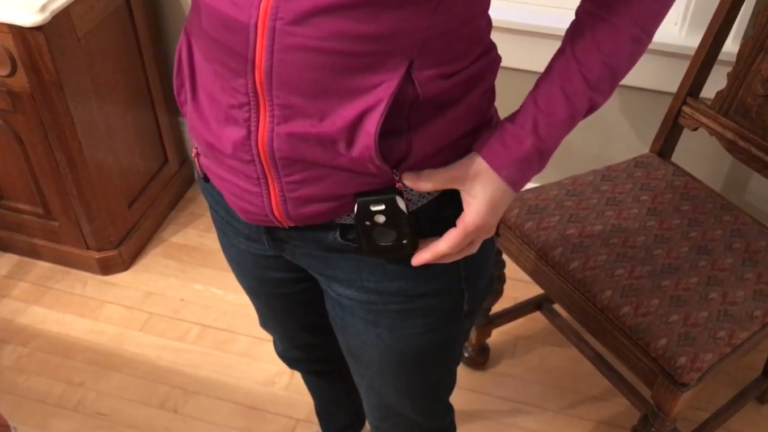
Understanding Medical Alert Systems
How Do Medical Alert Systems Work?
Medical alert systems are designed to provide a quick and efficient way for seniors to get help in case of an emergency. Here’s a step-by-step breakdown of how most medical alert systems work:
- Activation: The process begins when the user activates the alert. This is typically done by pressing a button on a wearable device, such as a pendant or wristband. Some systems also offer automatic fall detection, which can automatically send an alert if a fall is detected.
- Connection to the Monitoring Center: Once the alert is activated, the medical alert device connects to a monitoring center. This connection is made through a landline or cellular connection, depending on the type of system.
- Communication with the User: An operator at the monitoring center will then communicate with the user through a two-way speaker. They will assess the situation and determine the appropriate response.
- Emergency Response: If necessary, the operator will contact emergency services and provide them with the user’s location and any relevant medical information. In some cases, the operator may also contact family members or other designated contacts.
- Follow-Up: After the emergency services have been dispatched, the operator will stay on the line with the user until help arrives. They may also follow up later to ensure that the user received the necessary assistance.
Types of Medical Alert Systems
There are several types of medical alert systems available, each designed to meet different needs and lifestyles:
- In-Home Systems: These systems are designed for use in the home and typically require a landline or cellular connection. They usually come with a base unit and a wearable device with a help button.
- Mobile Systems: Mobile medical alert systems are designed for use both at home and on the go. They use GPS tracking technology and a cellular network to provide coverage wherever there is cell service.
- All-in-One Systems: These systems combine the features of in-home and mobile systems. They can be used at home or on the go and offer features like GPS location tracking and automatic fall detection.
- Specialized Systems: Some systems are designed to meet specific needs, such as systems with medication reminders for those who need help managing their medications, or systems with optional fall detection for those at high risk of falls.
Key Features of a Good Medical Alert System
When choosing a medical alert system, there are several key features to look for:
- Reliability: The system should have a reliable connection to the monitoring center and a long battery life to ensure it’s always ready when needed.
- Ease of Use: The system should be easy to use, even in stressful situations. Look for systems with large, easy-to-press buttons and clear, easy-to-understand instructions.
- Quality of Monitoring: The monitoring center should be staffed 24/7 by trained operators who can respond quickly and effectively in an emergency.
- Range: If you’re considering an in-home system, make sure it has a range that covers your entire home and yard.
- Price: Consider both the upfront costs and the monthly fees. Some companies also charge activation fees or equipment fees, so be sure to factor these into your budget.
- Contract Terms: Look for a company that offers flexible contract terms, such as month-to-month service. Avoid companies that require long-term contracts or have high cancellation fees.
- Extras: Some systems offer extra features, such as automatic fall detection, GPS location tracking, or medication reminders. While these features can add to the cost, they may be worth it for some users.
Understanding how medical alert systems work, the different types available, and the key features to look for can help you choose the right medical alert system for your needs. Whether you’re looking for a basic in-home system or a more advanced mobile system, there’s a medical alert system out there that can provide the peace of mind you need.

What are the benefits of a medical alert system for seniors?
Medical alert systems can provide peace of mind to seniors and their families, knowing that help is just a button press away. They can be particularly beneficial for seniors who live alone, have medical conditions, or are at risk of falls.
What are the Best Medical Alert System for Seniors in 2024?
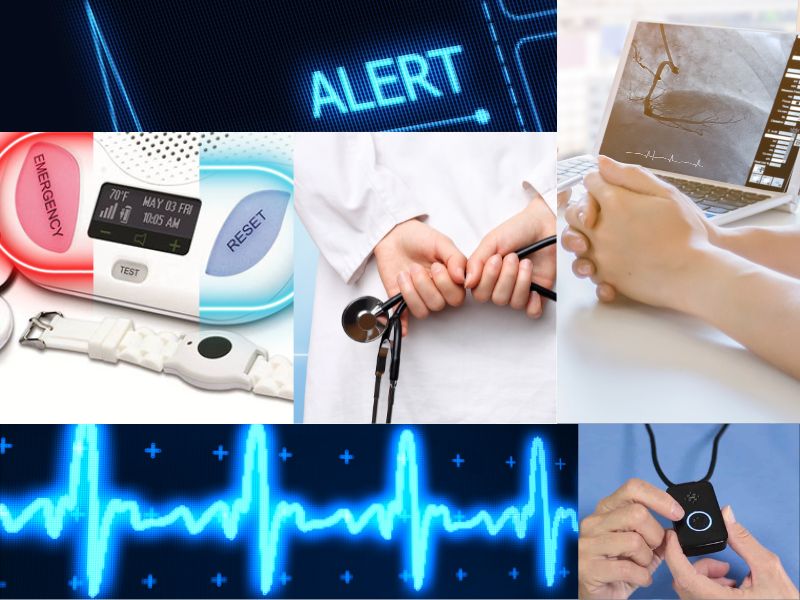
Reviews: The Best Medical Alert Systems for Seniors in 2024
Overview of Top 10 Medical Alert Systems for Seniors
The market is flooded with numerous medical alert systems, each with its unique features and offerings. Here, we provide an overview of the top 10 medical alert systems for seniors, based on various online reviews and user feedback:
1. Medical Guardian
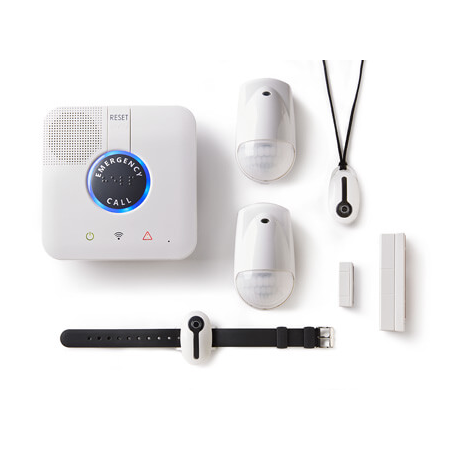
Medical Guardian
Our Rating:

5.0
Known for its best-in-class fall detection and a wide range of options to suit different lifestyles, including in-home systems and mobile medical alert systems.
Medical Guardian offers a range of systems to suit different needs. Their systems come with waterproof medical alert devices, 24/7 monitoring, and a landline or cellular connection. They also offer a mobile system with GPS tracking for active seniors.
Medical Guardian offers a wide range of options to suit different lifestyles, including in-home systems and mobile medical alert systems. They are known for their best-in-class fall detection.
Users appreciate the range of options available and the reliability of the automatic fall detection. Some users have mentioned that the customer service is excellent and responsive.
PROS
CONS
2. Life Alert
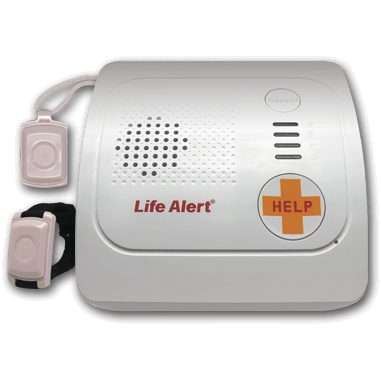
Life Alert
Our Rating:

4.7
Famous for its “Help, I’ve fallen, and I can’t get up!” advertisement, Life Alert offers a range of systems with 24/7 monitoring and emergency services connection.
Life Alert provides in-home systems and mobile systems with GPS. Their systems are easy to use and come with waterproof help buttons. However, they require a three-year contract, which is longer than most other providers.
Life Alert is famous for its “Help, I’ve fallen, and I can’t get up!” advertisement. They offer a range of systems with 24/7 monitoring and emergency services connection.
Users often mention the peace of mind they get from knowing that help is just a button press away. However, some users have expressed dissatisfaction with the long-term contract requirement.
PROS
CONS
3. Bay Alarm Medical
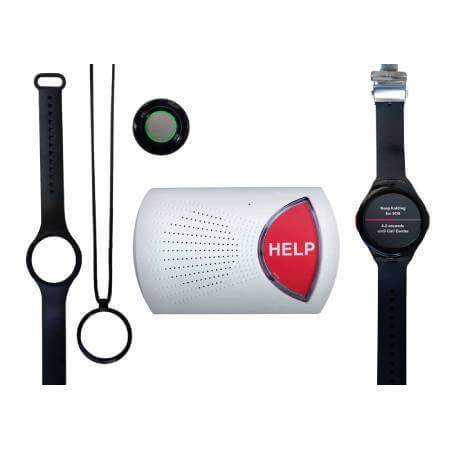
Bay Alarm Medical
Our Rating:

4.6
Offers affordable medical alert systems with optional automatic fall detection and GPS tracking. Bay Alarm Medical offers affordable options with no long-term contracts.
They provide in-home systems, mobile systems, and in-car medical alert. Their systems come with 24/7 monitoring and optional automatic fall detection.
Bay Alarm Medical offers affordable medical alert systems with optional automatic fall detection and GPS tracking.
Users appreciate the affordability of the systems and the optional automatic fall detection. Some users have mentioned that the customer service is helpful and responsive.
PROS
CONS
4. MobileHelp
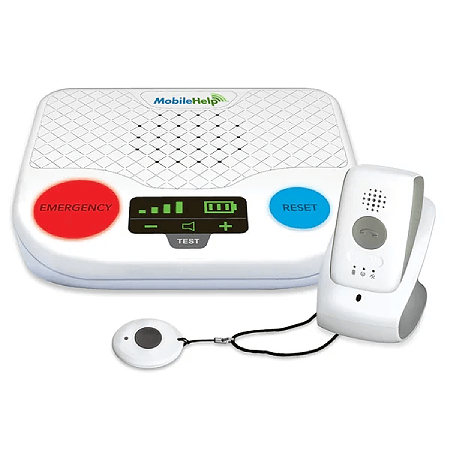
MobileHelp
Our Rating:

4.7
Specializes in mobile medical alert systems that work both at home and on the go. MobileHelp offers in-home systems and mobile systems with GPS. Their systems come with waterproof help buttons and 24/7 monitoring. They also offer a mobile system with GPS tracking for active seniors.
MobileHelp specializes in mobile medical alert systems that work both at home and on the go.
Users often mention the convenience and peace of mind of having a mobile medical alert system. However, some users have reported issues with the battery life of the mobile device.
PROS
CONS
5. ADT Health
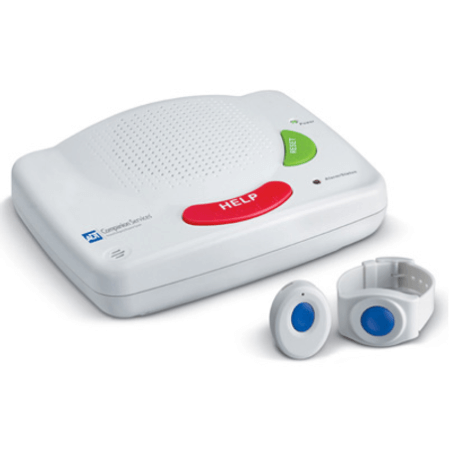
ADT Health
Our Rating:

4.6
From the well-known security company, ADT Health offers medical alert systems with 24/7 monitoring and a range of optional features.
ADT Health provides medical alert systems with 24/7 monitoring, two-way voice communication, and waterproof help buttons. They offer landline-based systems and cellular systems.
Users appreciate the 24/7 monitoring and the reliability of the system. Some users have mentioned that the customer service is excellent.
PROS
CONS
6. Philips Lifeline
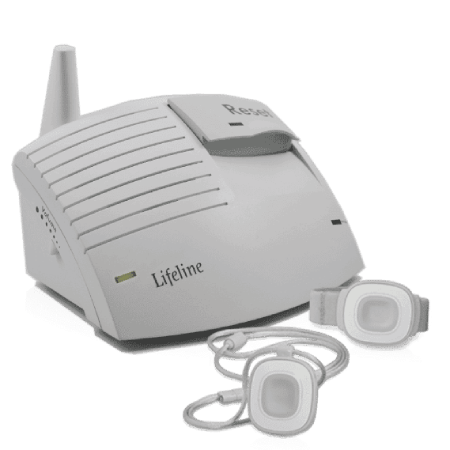
Philips Lifeline
Our Rating:

4.6
Offers a variety of systems, including ones with automatic fall detection and GPS location tracking.
Philips Lifeline offers a range of systems, including ones with automatic fall detection and GPS location tracking. Their systems come with waterproof help buttons and 24/7 monitoring.
Users often mention the reliability of the system and the peace of mind it provides. However, some users have reported issues with the cost and the customer service.
PROS
CONS
7. LifeStation

LifeStation
Our Rating:

4.6
Known for its excellent customer service and 24/7 monitoring center.
LifeStation offers in-home systems and mobile systems with GPS. Their systems come with waterproof help buttons and 24/7 monitoring.
Users often mention the excellent customer service and the reliability of the system. However, some users have reported issues with the range of the in-home system.
PROS
CONS
8. GreatCall Lively
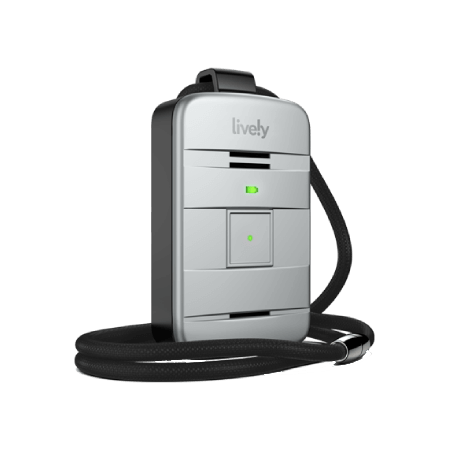
GreatCall Lively
Our Rating:

4.6
Offers a mobile device with emergency services connection, fall detection, and other health and safety features.
GreatCall Lively offers a mobile device with emergency services connection, fall detection, and other health and safety features. It also includes a simple user interface and large buttons, making it easy for seniors to use.
Users appreciate the multiple features of the mobile device. However, some users have reported issues with the cost and the battery life of the device.
PROS
CONS
9. QMedic

QMedic
Our Rating:

4.6
Offers simple, easy-to-use medical alert systems with 24/7 monitoring.
QMedic offers simple, easy-to-use medical alert systems with 24/7 monitoring. Their systems are waterproof and come with a wearable help button. They also offer a system with automatic activity and sleep tracking.
Users appreciate the simplicity and ease of use of the system. However, some users have reported issues with the lack of a mobile system.
PROS
CONS
10. Aloe Care Health
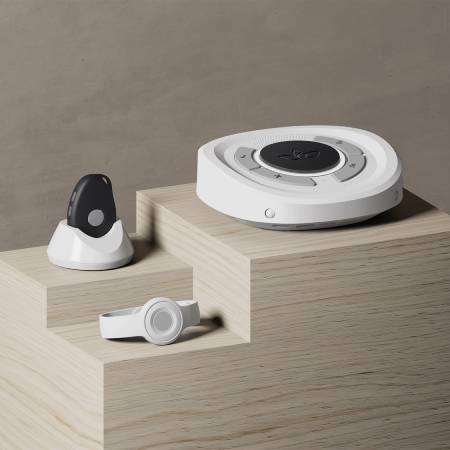
Aloe Care Health
Our Rating:

4.6
Offers a comprehensive system with features like fall detection, a mobile app for caregivers, and a voice-activated hub.
Aloe Care Health offers a comprehensive system with features like fall detection, a mobile app for caregivers, and a voice-activated hub. Their system also includes a mobile medical alert device for use outside the home.
Users appreciate the comprehensive system and the multiple features. However, some users have reported issues with the cost and the customer service.
PROS
CONS
In-Depth Analysis of Medical Alert Systems
Choosing the top medical alert system for seniors depends on individual needs, lifestyle, and budget. It’s important to consider factors such as the type of system (in-home or mobile), key features (like fall detection and GPS tracking), cost, and the reputation of the medical alert company.
Comparison of Top Medical Alert Systems
When comparing the top medical alert systems, it’s important to consider several factors such as the type of system (in-home or mobile), key features, cost, and the reputation of the medical alert company.
User Reviews and Experiences
User reviews and experiences can provide valuable insights into the performance and reliability of medical alert systems. It’s important to consider these along with the features, cost, and reputation of the medical alert company.
Cost Analysis of Medical Alert Systems
Overview of Costs Associated with Medical Alert Systems
The cost of medical alert systems can vary widely depending on the type of system, the features it includes, and the provider. Here are the main costs associated with medical alert systems:
- Equipment Costs: This includes the cost of the medical alert device itself, such as a pendant or wristband, and any additional equipment like a base station for an in-home system or a mobile device for a mobile medical alert system.
- Activation Fees: Some medical alert companies charge a one-time activation fee when you first sign up for their service.
- Monthly Fees: Most medical alert systems charge a monthly fee. This fee typically covers the use of the equipment and the monitoring service. The cost can vary depending on the features included, such as GPS tracking or automatic fall detection.
- Additional Service Fees: Some providers charge extra for additional services, such as medication reminders or location tracking.
Comparison of Costs Across Different Systems
Here’s a rough comparison of costs across different medical alert systems based on the information available online:
- Medical Guardian: Monthly fees start at around $29.95, with additional costs for features like fall detection.
- Life Alert: Life Alert doesn’t publicly disclose their prices, but online sources suggest that their monthly fees start at around $49.95, with an activation fee of up to $95.
- Bay Alarm Medical: Monthly fees start at around $19.95, with additional costs for features like fall detection and GPS tracking.
- MobileHelp: Monthly fees start at around $19.95 for in-home systems and $37.95 for mobile systems.
- ADT Health: Monthly fees start at around $29.99, with additional costs for features like fall detection.
- Philips Lifeline: Monthly fees start at around $29.95, with an activation fee of $50.
- LifeStation: Monthly fees start at around $19.95, with additional costs for features like fall detection.
- GreatCall Lively: The device costs around $49.99, with monthly fees starting at $24.99.
- QMedic: Monthly fees start at around $30, with no activation or equipment fees.
- Aloe Care Health: Monthly fees start at around $29.99, with additional costs for features like fall detection and a mobile app for caregivers.

Tips for Choosing an Affordable Medical Alert System
When choosing an affordable medical alert system, here are some tips to keep in mind:
- Understand What’s Included: Make sure you understand what’s included in the monthly fee. Does it cover all the features you need, or will you have to pay extra for things like fall detection or GPS tracking?
- Compare Prices: Prices can vary widely between different medical alert companies. Make sure to compare prices and understand what you’re getting for your money.
- Check for Hidden Fees: Some companies charge activation fees, equipment fees, or other hidden costs. Make sure to ask about these upfront.
- Consider Your Needs: The most affordable system may not be the best fit for your needs. Consider what features are most important to you and choose a system that offers those at a price you can afford.
While the cost is an important factor when choosing a medical alert system, it’s also important to consider the features and reliability of the system. After all, the purpose of these systems is to provide peace of mind and help ensure thesafety of you or your loved ones.
Technology and Medical Alert Systems
Role of Technology in Medical Alert Systems
Technology plays a crucial role in the functioning and effectiveness of medical alert systems. Here’s how:
- Connectivity: Medical alert systems rely on connectivity to function. This can be through a landline or cellular connection. The system uses this connection to communicate with the monitoring center in case of an emergency.
- Two-Way Communication: Most medical alert systems have a two-way communication feature. This allows the user to speak directly with a trained operator at the monitoring center.
- Automatic Fall Detection: Some medical alert systems come with automatic fall detection technology. This feature can detect if the user has fallen and automatically send an alert to the monitoring center.
- GPS Tracking: GPS tracking technology is often included in mobile medical alert systems. This allows the monitoring center to locate the user in case of an emergency.
- Battery Life: Technology also plays a role in the battery life of the medical alert device. Most devices are designed to last for several years without needing a battery replacement.
GPS Tracking and Location Tracking in Medical Alert Systems
GPS tracking and location tracking are important features in mobile medical alert systems. Here’s why:
- Emergency Situations: In an emergency, it’s crucial that first responders can locate the user quickly. GPS tracking allows the monitoring center to provide the user’s location to emergency services.
- On the Go: For active seniors who are often out and about, GPS tracking can provide peace of mind. Even if they’re away from home, they can still get help in an emergency.
- Dementia Patients: For seniors with dementia who may wander and get lost, GPS tracking can be a lifesaver. It allows caregivers or emergency services to locate them quickly.
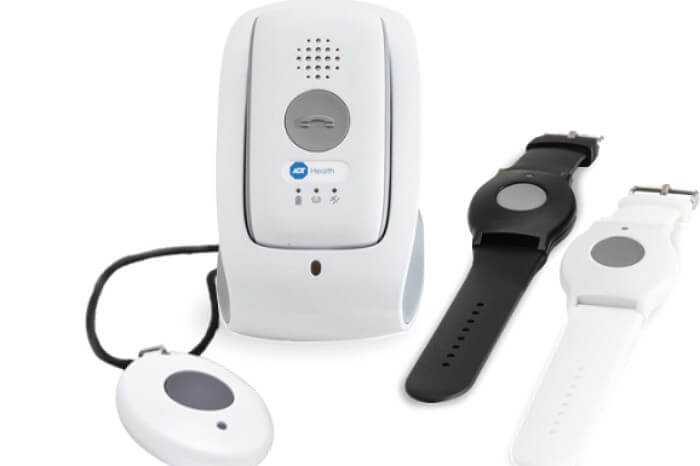
Future of Medical Alert Systems: Predictions for 2024 AND BEYOND
The future of medical alert systems looks promising, with technology continuing to drive advancements in this field. Here are some predictions for the current year and beyond:
- Integration with Smart Home Devices: As smart home technology becomes more prevalent, we can expect to see more medical alert systems integrating with these devices. This could allow for features like voice-activated alerts or automatic alerts triggered by smart home sensors.
- Advanced Fall Detection: While automatic fall detection is already a feature in some medical alert systems, this technology is likely to become more advanced and reliable in the future.
- Health Monitoring: We may see more medical alert systems incorporating health monitoring features, such as heart rate monitoring or sleep tracking. This could provide valuable health data and even alert caregivers or emergency services to potential health issues.
- AI and Machine Learning: Artificial intelligence and machine learning could be used to analyze user behavior and predict potential emergencies before they happen.
Technology plays a crucial role in medical alert systems and will continue to drive advancements in this field. As we move into this year and beyond, we can expect to see medical alert systems becoming more advanced, reliable, and integrated with other technologies.
Medical Alert Systems and Emergency Services
How Medical Alert Systems Connect to Emergency Services
Medical alert systems play a crucial role in connecting users to emergency services in times of need. Here’s how they work:
- Alert Button: The user wears a device with an alert button. When the button is pressed, it sends a signal to the medical alert system.
- Communication: The medical alert system then establishes communication with the user. This is usually done through a two-way speaker system. The user can explain the situation, or if they’re unable to communicate, the system can still proceed based on the alert.
- Connection to Emergency Services: If an emergency is detected, the medical alert system contacts emergency services. The system can provide vital information, such as the user’s location and any known medical conditions.
- Monitoring Center: In many cases, medical alert systems are monitored 24/7 by a monitoring center. Trained operators at the center can assess the situation and contact emergency services if needed.
Role of Monitoring Centers in Medical Alert Systems
Monitoring centers are a key component of many medical alert systems. Here’s what they do:
- 24/7 Monitoring: Monitoring centers operate around the clock, ensuring that help is always available when a user presses their alert button.
- Emergency Response: When an alert is received, the monitoring center establishes communication with the user. Trained operators can assess the situation and decide on the best course of action.
- Contacting Emergency Services: If the user needs medical assistance, the monitoring center can contact emergency services. They can provide important information, such as the user’s location and any known medical conditions.
- Support and Reassurance: In addition to handling emergencies, monitoring centers also provide support and reassurance to users. Knowing that help is just a button press away can provide peace of mind to users and their families.
Importance of Quick Response in Medical Emergencies
In a medical emergency, a quick response can be lifesaving. Here’s why:
- Golden Hour: In medicine, the first hour after an injury or the onset of acute illness is often referred to as the “golden hour”. Getting medical treatment within this time frame can significantly improve outcomes.
- Preventing Complications: A quick response can prevent complications. For example, in the case of a fall, getting help quickly can prevent further injury caused by long periods of immobility.
- Peace of Mind: Knowing that help is available at the press of a button can provide peace of mind to users and their families. This can be particularly important for seniors living alone.
Medical alert systems play a crucial role in providing a quick response in medical emergencies. They connect users to emergency services and provide 24/7 monitoring, ensuring that help is always available when needed.
Frequently Asked Questions
Common Questions About Medical Alert Systems
When considering a medical alert system, people often have a number of questions. Here are some of the most common ones:
What is a medical alert system?
A medical alert system is a device that allows users to call for help in an emergency situation. It typically consists of a wearable help button and a base unit or mobile device that can communicate with a monitoring center or directly with emergency services.
How does a medical alert system work?
When the user presses the help button, the medical alert system establishes communication with the monitoring center or directly with emergency services. If an emergency is detected, help can be dispatched to the user’s location.
What are the benefits of a medical alert system for seniors?
Medical alert systems can provide peace of mind to seniors and their families, knowing that help is just a button press away. They can be particularly beneficial for seniors who live alone, have medical conditions, or are at risk of falls.
What features should I look for in a medical alert system?
Key features to look for include 24/7 monitoring, two-way communication, automatic fall detection, GPS tracking, and a waterproof help button. The best features for you will depend on your individual needs and lifestyle.
How much does a medical alert system cost?
The cost of a medical alert system can vary widely depending on the provider and the features included. Costs typically include an equipment fee, a one-time activation fee, and a monthly service fee.
Are there any additional fees associated with a medical alert system?
Some medical alert companies charge additional fees for features like automatic fall detection or GPS tracking. There may also be fees for installation or equipment replacement.
What is the role of a monitoring center in a medical alert system?
The monitoring center receives alerts from the medical alert system and establishes communication with the user. Trained operators can assess the situation and contact emergency services if needed.
How does a medical alert system connect to emergency services?
If an emergency is detected, the medical alert system or the monitoring center can contact emergency services. The system can provide important information, such as the user’s location and any known medical conditions.
What is automatic fall detection and why is it important?
Automatic fall detection is a feature that can detect if the user has fallen and automatically send an alert to the monitoring center. This can be particularly important for seniors who are at risk of falls.
What is the difference between an in-home system and a mobile medical alert system?
An in-home system works within the user’shome and typically uses a landline or cellular service to communicate with the monitoring center. A mobile medical alert system works anywhere and uses a cellular service to communicate with the monitoring center. It often includes features like GPS tracking.
How Personal Emergency Response Systems Work?
A Personal Emergency Response System (PERS) is a device that allows users to call for help in an emergency with the push of a button. The system typically includes a base unit and a wearable device with a help button. When the button is pressed, the system connects to a monitoring center, and help can be dispatched if needed.
Medical alert systems can provide peace of mind and safety for seniors, particularly those living alone or with medical conditions. It’s important to understand how these systems work and what to look for when choosing a system.
Choosing the Right Medical Alert System
Factors to Consider When Choosing a Medical Alert System
When choosing a medical alert system, there are several factors to consider:
- Type of System: Decide whether an in-home system or a mobile medical alert system is the best fit for your lifestyle and needs. If you’re often on the move, an on the go system might be more suitable.
- Features: Consider what features are important to you. This could include 24/7 monitoring, two-way communication, automatic fall detection, GPS tracking, and a waterproof help button. If you’re at risk of falls, a system with a fall detection device could be particularly beneficial.
- Cost: Consider the upfront costs, monthly fees, and any potential additional costs for extra features or services.
- Reputation of the Company: Look at reviews and ratings to assess the reputation of the medical alert company. Consider their customer service, reliability, and response time.
- Contract Terms: Check whether the company requires a long-term contract or whether they offer a month-to-month service.
- User Experience: Consider the experiences of other medical alert system users. User reviews can provide valuable insights into the reliability and usability of the system.
- Specific Brands: If you’re considering specific brands like Life Alert, compare their systems with those of other providers. Look at the features, costs, and reviews of Life Alert devices and other mobile medical alert devices.
- Monitoring: Decide whether you want a monitored medical alert system that connects to a professional monitoring center, or a personal emergency response system that allows you to choose who is contacted in an emergency.
By considering these factors, you can choose a medical alert system that meets your needs and provides peace of mind.
How to Choose the Best Medical Alert System for Your Needs
Here’s a step-by-step guide on how to choose the best medical alert system for your needs:
- Assess Your Needs: Consider your lifestyle, health, and living situation. Do you spend a lot of time at home or are you often out and about? Are you at risk of falls? Do you have any medical conditions that could require immediate attention?
- Research: Look at different medical alert companies and the systems they offer. Read reviews and ratings to get an idea of the quality of their products and services.
- Compare: Compare different medical alert systems based on their features, costs, and contract terms. Consider what is most important to you and how each system meets those needs.
- Ask Questions: Don’t hesitate to contact the medical alert companies to ask any questions you may have. This can also give you an idea of their customer service.
- Trial Period: If possible, choose a medical alert company that offers a trial period. This allows you to test the system and see if it meets your needs before committing long-term.
Tips for Making the Right Choice
When choosing a medical alert system, here are some tips to help you make the right choice:
- Don’t Rush: Take your time to research and compare different systems. Don’t feel pressured to make a decision quickly.
- Ask for Recommendations: Ask friends, family, or healthcare providers if they have any recommendations. Personal experiences can provide valuable insights.
- Consider Future Needs: While it’s important to choose a system that meets your current needs, also consider your potential future needs. For example, you might not currently need automatic fall detection, but it could become important as you age.
- Understand the Contract: Make sure you fully understand the contract terms before signing up. Look for any hidden fees or terms that could lock you into a long-term contract.
Choosing the right medical alert system is a personal decision that should be based on your individual needs, lifestyle, and budget. By taking the time to research, compare, and consider your options, you can find a system that provides peace of mind and helps ensure your safety.
Conclusion and Recommendations
Recap of Key Points
In this comprehensive guide, we’ve explored the world of medical alert systems and their importance, especially for seniors. Here are the key points we’ve covered:
- Understanding Medical Alert Systems: We’ve learned how medical alert systems work, the different types available, and the key features to look for.
- Top Medical Alert Systems for Seniors: We’ve reviewed the top 10 medical alert systems for seniors, providing an overview and detailed review of each system.
- Cost Analysis: We’ve looked at the costs associated with medical alert systems, including a comparison of costs across different systems and tips for choosing an affordable system.
- Technology and Medical Alert Systems: We’ve explored the role of technology in medical alert systems, including the use of GPS tracking and predictions for the future of these systems.
- Medical Alert Systems and Emergency Services: We’ve discussed how medical alert systems connect to emergency services and the role of monitoring centers.
- FAQs: We’ve answered some of the most common questions about medical alert systems.
- Choosing the Right System: We’ve provided a guide on how to choose the right medical alert system for your needs, including factors to consider and tips for making the right choice.
Personal Recommendations
When choosing a medical alert system, it’s important to consider your individual needs, lifestyle, and budget. Here are some personal recommendations:
- For Active Seniors: If you’re an active senior who spends a lot of time outside the home, a mobile medical alert system with GPS tracking could be a good fit. Consider systems like MobileHelp or GreatCall Lively. These mobile devices are designed for on the go use and can provide emergency assistance wherever you are.
- For Seniors at Risk of Falls: If you’re at risk of falls, consider a system with automatic fall detection. Medical Guardian and Bay Alarm Medical offer this feature. These fall detection devices can automatically send an alert to the monitoring center if a fall is detected, even if you’re unable to press the help button.
- For Budget-Conscious Seniors: If cost is a major concern, consider a system that offers a good balance of affordability and features. Bay Alarm Medical and LifeStation are often praised for their affordability. Be sure to understand the full cost, including any per month fees and additional costs for extra features or services.
- For Seniors Who Prefer In-Home Systems: If you prefer a system that works within your home, consider an in-home system from a company like LifeStation or ADT Health. These systems can provide peace of mind at home, with features like emergency responders and 24/7 monitoring.
- For Seniors Considering Life Alert: If you’re considering a Life Alert system, be sure to compare it with other medical alert system providers. While Life Alert is a well-known brand, there are many other medical alert system companies that offer comparable services, often at a more competitive price.
The best medical alert systems are those that meet your individual needs and preferences. Whether you’re looking for a system with GPS tracking, fall detection, or 24/7 monitoring, there’s a medical alert system out there that can provide the safety and peace of mind you need.
Final Thoughts
Choosing the best medical alert system is a personal decision that should be based on your individual needs, lifestyle, and budget. With the wide range of systems available, it’s important to take the time to research, compare, and consider your options to find the system that best meets your needs.
Whether you’re looking for a home medical alert system or a mobile device for on-the-go protection, there are many medical alert providers to choose from. The alert systems are more advanced and user-friendly than ever before, offering features like fall detection devices and GPS medical alert systems.
When considering the medical alert systems cost, remember to look beyond the initial price. Consider the monthly costs and whether the provider offers a price lock guarantee. Also, consider the reputation of the medical alert provider and whether they offer monitored medical alert systems.
Don’t forget to consider other medical alert companies beyond the most well-known ones. Some of the leading medical alert systems come from lesser-known companies that offer excellent service and competitive pricing. And remember, whether you’re considering a Life Alert system or another provider, the most important thing is that the system meets your needs.
In conclusion, medical alert systems can provide peace of mind and safety for seniors, particularly those living alone or with medical conditions. As we move, we can expect to see medical alert systems becoming more advanced, reliable, and integrated with other technologies. Whether you’re an active senior who’s often out and about, or someone who spends most of your time at home, there’s a medical alert system out there that can provide the safety and peace of mind you need.
